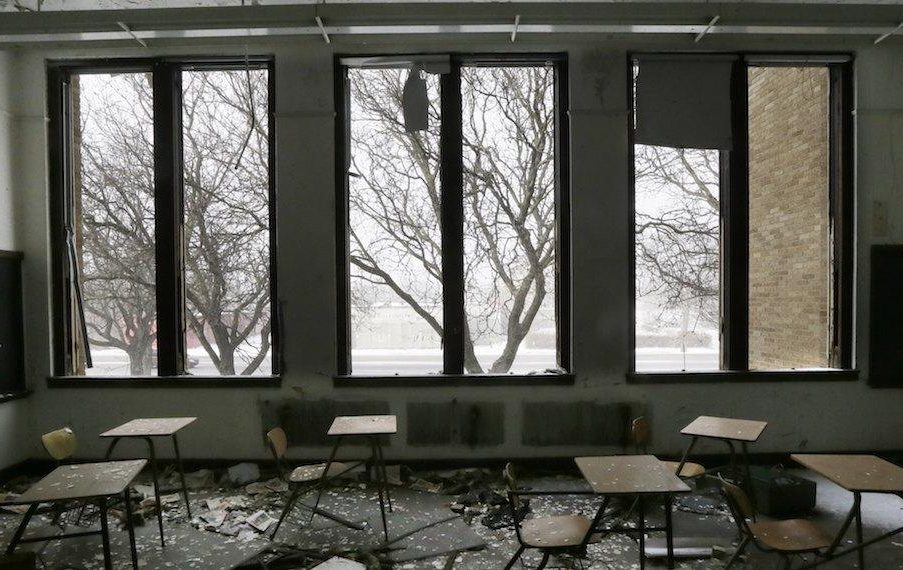Education is in for an overhaul. It won't all be good.
Education or Indoctrination?

The problem requires more than just a tweet to solve.
The campus orthodoxy that grips so many institutions of higher education is a daunting problem, stifling critical thought and sowing doubts about how much faith we can have in the integrity of scholarship on vital questions of social import. What, if anything, can or should be done about this? Last week, in his inimitable, five-thumbed style, President Trump tackled the issue.
The president tweeted, “Too many Universities and School Systems are about Radical Left Indoctrination, not Education. Therefore, I am telling the Treasury Department to re-examine their Tax-Exempt Status and/or Funding, which will be taken away if this Propaganda or Act Against Public Policy continues. Our children must be Educated, not Indoctrinated!”
Far from providing a simple answer to a complicated question, though, the president wound up raising a crucial question: Just how does one draw the line between indoctrination and education, anyway?
A Feature, Not a Bug
Keep in mind that schools and colleges enjoy a dual mandate: They are asked to produce students who are knowledgeable and reflective, and also to shape their views and values. Under normal circumstances, there is a healthy tension between these two missions: As students learn foundational values like responsibility or citizenship, they also learn to ask hard questions about such things and the way they play out in the world.
Indeed, the architects of the American educational tradition—men like Benjamin Rush and Horace Mann—unapologetically believed that indoctrination in the civic virtues was a vital part of education. The aim was to teach students the habits of mind that would equip them to be good citizens—to equip them to be “republican machines,” in Rush’s memorable phrase.
Now, readers might imagine that a reasonable person should really be able to distinguish anodyne instruction in civic virtue from the ideologically charged monoculture so evident on many campuses. It seems that, much as with obscenity, “We know indoctrination when we see it.”
In practice, though, the bright line that demarcates indoctrination from plain old education can prove maddeningly elusive. It turns out there’s no simple way to determine where a critical analysis of the American Revolution leaves off and left-wing indoctrination begins.
Indeed, higher ed’s “radical left” would counter that they don’t regard putatively “neutral” concepts, such as personal responsibility or civility, as neutral at all. They’d argue, with some plausibility, that they are simply teaching values and virtue, just from a different orientation.
Meanwhile, there really aren’t many smoking guns that can readily prove “indoctrination.” Even the most radical of colleges tend to publicly describe themselves in beige tones, promising lots of “rigor,” “exploration,” and “dialogue.” There’s no simple way to distinguish the institutions that mean all this from those that don’t.
And, in any event, the presence of a sociology professor who engages in ideological rants (or a whole campus full of them) doesn’t provide any basis for stripping an institution of a tax exemption. After all, even ideological entities can be tax exempt (think of Greenpeace or the Heritage Foundation).
Public funding is another question (we’ll skip past the president’s peculiar suggestion that the Treasury Department controls college funding). But one needn’t work hard, at a time when woke mobs are defacing status of Lincoln and Washington, to imagine all the problems with trying to condition funding on judgments of an institution’s ideological biases.
Which federal bureaucrats would we trust to decide what constituted an unacceptable degree of “indoctrination”? And how would they judge? This seems calculated to allow parties in power to harass colleges that don’t share their views.
Trump has fingered a serious issue. And there are potential remedies. But they don’t involve asking government officials to do what Trump suggested. Rather, there are at least four avenues, all of them more practical and more promising than trying to have federal officials decide which institutions have wandered into “indoctrination.”
Real Solutions
First, there is a neutral principle that can do some of the work here: Colleges and universities which wish to collect federal research dollars should be obliged to ensure that inquiry on campus is unfettered. The point is to focus on campuses which choose to engage in federally-funded research and to establish a principle which is neutral with regard to the views or values in question.
After all, the federal-campus research partnership is premised on the expectation that universities will provide a place where scholars can pursue truth without fear or favor. When campuses adopt restrictions on speech or processes that impede inquiry, they should become ineligible for their share of the $40 billion that Washington spends each year on university-based research. The cost in dollars, prestige, and faculty departures would have a big impact on the behavior of the most influential institutions.
Second, there’s a big role for transparency. Colleges and universities hide suppression of free speech behind a cloak of respectability. The incidents that pierce that veil get dismissed as exceptions, no matter how frequently they occur. State governments (and Washington) should expect institutions to regularly issue audited reports on the state of free inquiry on campus.
Colleges should be expected to publicly report on investigations into speech or “biased” behavior and on any restrictions of expression, and to annually survey students and faculty on the state of free inquiry on campus. Meanwhile, private donors and think tanks should extend their efforts to document the extent of the campus monoculture. Such efforts would enable students to make informed choices and make it easier to document the extent of the problems nationally.
Third, there’s a crying need for the creation of new educational institutions, of many kinds, which offer students an education that is free from left-wing indoctrination. This requires launching new institutions, establishing a pipeline of faculty, and developing the academic infrastructure to support these institutions. What we need are not only or even primary universities: any serious overhaul of education needs to start from the ground up, taking into account the crucial role of elementary and high school education.
In an era of shuttered colleges, hybrid learning, and massive disruption, the prospect of launching such efforts is less daunting than it was just twelve months ago. Moreover, this solution requires no government intervention at all: If donors troubled by the direction of higher education ceased giving to their alma mater and instead supported concerted efforts to launch new schools and colleges, the educational landscape could be lit by an explosion of energy.
Finally, there’s a desperate need for lawmakers or litigators to bust up the college-industrial cartel that has grown up around the practice of college degrees serving as a requirement for professionally rewarding, remunerative jobs. This allows prestigious colleges to get away with all manner of shenanigans, while making it harder for new educational alternatives to emerge that are untethered to the usual campus ideologies.
The thing is, the college degree was never intended as a hiring test and any reasonable reading of Title VII of the Civil Rights of 1964 suggests that using it in this way may well be illegal—if anyone were to press the point. Shattering the college-industrial complex would stop colleges from forcing students to pay a tithe for the privilege of seeking remunerative work. As a result, colleges would face heightened pressure to demonstrate the utility of their degrees, which would be a particular blow to the places where rigor and practical content have been pushed aside by ideological dogma.
Trump touched on an important, troubling issue. Actually addressing the challenge requires more, however, than lamenting the current state of the world or threatening to empower federal bureaucrats. It requires identifying clear, defensible principles and then acting on them.
The American Mind presents a range of perspectives. Views are writers’ own and do not necessarily represent those of The Claremont Institute.
The American Mind is a publication of the Claremont Institute, a non-profit 501(c)(3) organization, dedicated to restoring the principles of the American Founding to their rightful, preeminent authority in our national life. Interested in supporting our work? Gifts to the Claremont Institute are tax-deductible.
And that’s a good thing.
We must re-train our students in the art of seeing the highest and best.
A Warning to Calvin University.
Making education domestic again.
Teaching the test has made our country lose its way.






